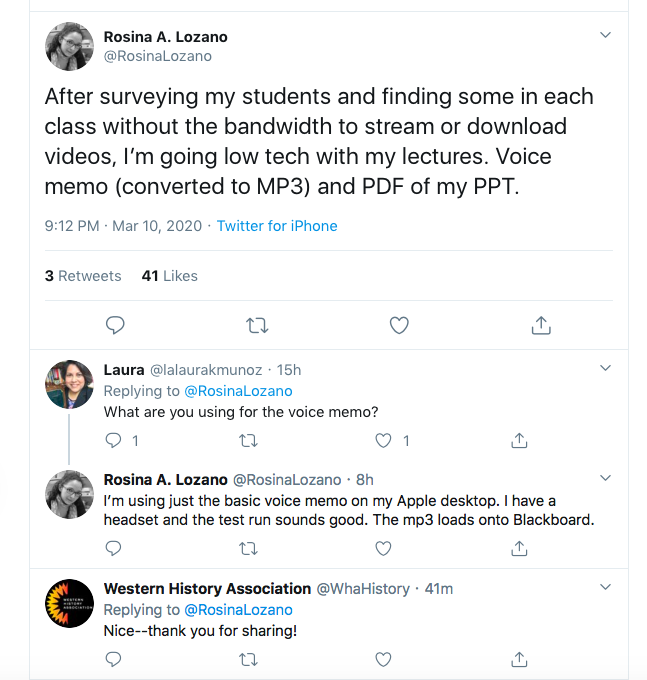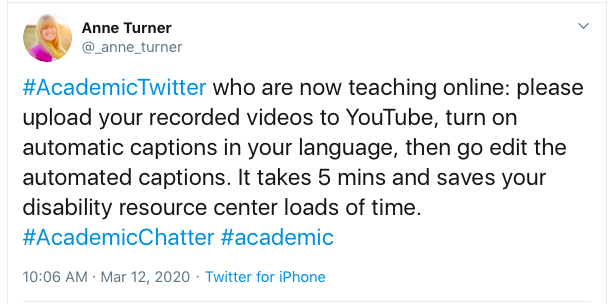COVID-19 and the Shift to Online Teaching and Writing Center Services: a Resource List
IMPORTANT:There are crucial, valid concerns about the expectations institutions of K-12 and higher education are placing on teachers, writing center administrators, and students to make a shift to online learning. The longstanding research on online learning and instruction, as well as our recent experiences with these modes of learning, demonstrate the challenges of such a shift, especially given the training, resource requirements, and infrastructure concerns involved. One-off or short-term online training sessions for teachers to make this shift to teaching online, especially for those of us unfamiliar with research-based practices for this kind of learning, lack appropriate time, depth, and support from administration and institutions, themselves. Asking teachers, their students, and the communities of which we are a part to make such a haphazard and inadequate shift is ineffectual and unjust.
What to do? Scholar and teacher Rebecca Barrett-Fox (2020) suggests the following in “Please Do a Bad Job of Putting Your Courses Online“:
If you are getting sucked into the pedagogy of online learning or just now discovering that there are some pretty awesome tools out there to support student online, stop. Stop now. Ask yourself: Do I really care about this? (Probably not, or else you would have explored it earlier.) Or am I trying to prove that I’m a team player? (You are, and don’t let your university exploit that.) Or I am trying to soothe myself in the face of a pandemic by doing something that makes life feel normal? (If you are, stop and instead put your energy to better use, like by protesting in favor of eviction freezes or packing up sacks of groceries for kids who won’t get meals because public schools are closing.)
Where do we go from here then?Teachers and writing center administrators can advocate with department chairs and immediate administration to consider longer term plans, such as canceling classes for the remainder of the semester/term, offering incomplete grades to all students, switching to pass/fail grading and other alternative assessment methods, creating longer term learning that extends through the summer, and providing community aid, such as micro-grants and other funding for students who need financial support to learn over the longer term. Please take time to look at Barrett-Fox’s (2020) suggestions HERE, the most crucial of which call for us to slow down, listen to one another and our students, and give one another time to adjust as much possible. As Kornbluh (2020) points out in “Academe’s Coronavirus Shock Doctrine“:
If instruction is going to be utterly transformed, then other protocols and systems must be too, and faculty members ought to insist upon assurances and protections now…We must seize this moment to organize for student-debt relief, student and faculty health care, and the public goods of research and expertise. Tasked with conjuring continuity in a pandemic, we find ourselves at a precipice that clarifies how much we have overworked to weather the structural adjustment of higher ed, and how much we have in common with each other — with the hourly employees who make the university and its surrounding businesses go, with our students, with the school teachers who’ve been struggling and striking nationwide.
Other ideas and suggestions for this process are welcome here in the comments or through the “Contact” tab above in the menu.
Resources: See the resources at the links below for shifting to online instruction and learning:
For writing center administrators:
- Brigham Young University (n.d.) Online writing center consultation training guide.
- Online Writing Centers Community
For faculty:
- Conference on College Composition and Communication (2013)Statement of Principles and Example Effective Practices for Online Writing Instruction. This statement focuses on practices for composition classrooms but the principles and especially the examples may work well for your transition.
- Global Society of Online Literacy Educators (GSOLE):
- TheJust In Time Hub is a gateway to our various resources, including those below as well as excellent written materials to help you think through course conversion/migration; we’ll be updating with other materials on the fly: www.glosole.org/justintime.html
- Just Ask GSOLEprovides a direct link to discussion forums moderated by GSOLE online writing/literacy instruction experts who can answer your specific questions: www.glosole.org/justaskgsole.html
- Walk-In Webinars is a direct link to live Zoom sessions hosted by GSOLE members; the schedule of facilitators is listed there along with specific topics: www.glosole.org/walkinwebinars.html
- Email, Twitter, and Website: JustAskGSOLE@glosole.org. You can also follow GSOLE on twitter @gsoleducators for updates on GSOLE’s efforts and visit our general website at www.glosole.org for other material and information.
- Gonzalez Van Cleve (2020) Letter to students. (Professor of sociology at Brown University)
- Kafka, et al. (2020) Coping with coronavirus: how faculty members can support students in traumatic times. Chronicle of Higher Education.
- Lozano (2020) Low-tech strategies for recording lectures:

- Senior (n.d) How to be a better online teacher. The Chronicle of Higher Education.
- Screen Cast-o-Matic(asynchronous tool for creating online videos with PPTs, etc.:)
- Stiltanen (2020) Swiching your teaching to zoom on short notice?
- Synchronous tools for conferencing with students and colleagues: Web Ex, Zoom, Skype
- Tech Has No Age (2020) Adding captions in PowerPoint and slides in Zoom YouTube.
- Turner (2020) Suggestions for making online video instruction accessible through transcripts:

- University of Maryland, Baltimore Country, Faculty Development Center (2020) Keep on teaching
- Wan (2020) Moving your writing class online:a thorough list of guides/advice from writing programs administrators (WPAs), social media discussions about strategies and tactics, lesson plans, general advice about shifting to online teaching/courses, etc.
- Warnock (2019) Personal, Accessible, Responsive, Strategic: Resources and Strategies for Online Writing Instructors
- Warnock (n.d) Teaching Writing Online.